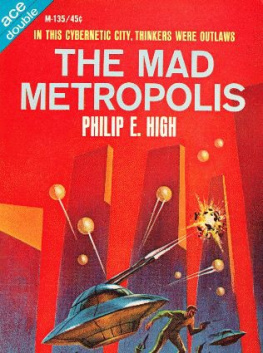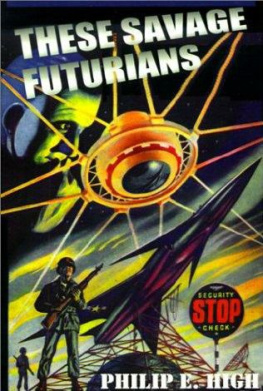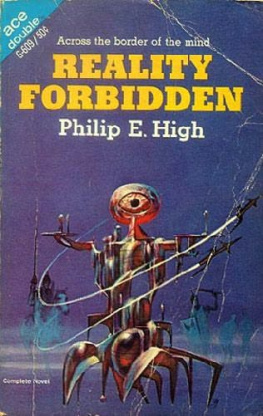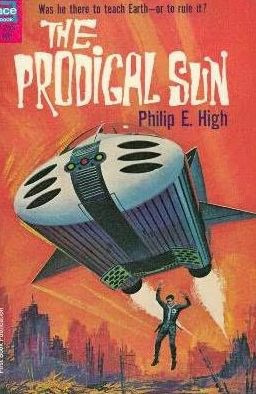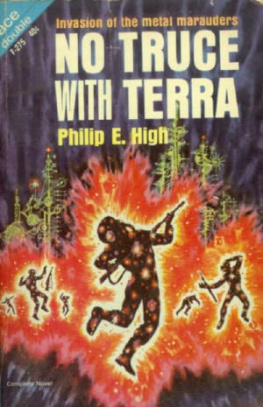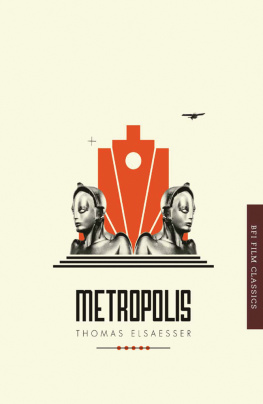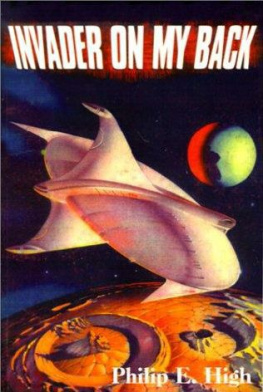Philip E. High
The Mad Metropolis
Chapter I
THEY DISPOSED OF Cook by the simple expedient of crowding him against the emergency door of the bar, sliding it open behind his back and pushing him into the street. They then shut the door in his face and re-sealed it from the inside so that he could not get back. The entire operation took only eleven seconds and no one noticed. The operators were pleased with their success, not to say a little smug. They had been paid a Purple each for the job and it had been child's play. Too often they had been paid a couple of Reds for a nasty one which had to be undertaken under the noses of the Nonpol or virtually in the regular patrols of the legal police, and those sort of jobs were risky indeed.
This one, however, had been so easy and so casually committed they felt almost innocent. After all, they hadn't actually killed the man, not directly, anyway. All they had done was to maneuver him into a position where his chances of survival for more than an hour were unlikely in the extreme.
As he had at least nine hours before he could hope for any help, his demise was a foregone conclusion.
Perhaps, fortunately, the four executioners were not thinking men. It never occurred to them to ask why they should have been paid so much to dispose of a ninety I.Q. Prole who was exactly the same as the seven hundred other Proles employed by the Combine.
Cook didn't know either and was in no position to think about it. For several seconds he was mentally and physically paralyzed with terror. He thought of beating on the door and shouting that he was outside, but he knew that before anyone heard him the noise would attract attention-the wrong kind of attention.
His only hope was to stand absolutely still and pray for a miracle-only he didn't believe in miracles. All Cook believed in were facts, and the facts were that he was out in the street at night. No one went out at night unless in an armor-taxi or, if rich, in a fast hypnad flyer.
Cook, himself, had never left the Combine since first being employed there at the edge of eighteen-why should he? The giant block contained his place of employment, nine hundred cramped living cubicles, and all the recreation facilities that science could provide. There were gymnasiums, parks and, with hypnad techniques, a blazing summer beach complete with swaying palms, dreamy lagoons and Atlantic rollers.
Generally speaking, a Prole lived, mated, procreated and died in the block. An intelligence quota of only ninety seldom asked or desired more. This was a pleasant, secure and gently regulated life, and few had the ambition to step beyond it.
In these pleasantly familiar surroundings Cook had left his cubicle and descended by the gravity shaft to his favorite bar for the customary evening drink. There, for no comprehensible reason, he had been crowded against a door which should have been sealed and pushed into the street. Now, persons unknown, perhaps quite unaware of his predicament, had re-sealed the door with him on the outside.
Cook rated his chances of receiving grievous bodily harm at a conservative one hundred and fifty percent, his chances of survival at an optimistic two. If he survived, hospitalization would be painful and protracted.
He didn't move, apart from his eyes and an uncontrollable twitch at the corner of his mouth; he stood perfectly still against the section of the building which was now an undistinguishable emergency door. Sweat trickled slowly down his face, but he had enough self-control to confine his breathing to near silence.
One never knew what was out there or what kind of devices were alert for such minor signals as the respiration of the lungs, the beat of the human heart or the chemical processes of sweat.
Above him the building which he had just left soared upwards until it was lost in shadow, and before him stretched the street.
It was a brilliantly lit thoroughfare-a mile-wide river of non-reflecting blackness, yet somehow dwarfed by the soaring buildings on either side.
A street where one stood as naked and as visible as a black fly on a sheet of white paper-Oh God, Oh God, what am I going to do?
From the opposite side of the street, a red light flashed on and off like a beckoning, be-ringed finger.
A woman? Perhaps he could make her apartment and stay there until dawn? Hope died within him almost as soon as he had thought of it. In the first place he'd never get across the street, and, in the second, a woman who could afford a call-light would regard his meager supply of green exchange with the contempt it deserved. She was after bigger game, the wealthy wolves, the prowlers and the psychos, who could afford to risk the night in hypnad flyers.
Police caller? No. The nearest one was just visible nearly a mile away at the beginning of the next block; he'd never make it.
Cook stood there, trying to reason his way out of an impossible situation and knowing he couldn't. Worse, this was not new; from all accounts it happened quite frequently. A man offended an overseer or an exec or fell down on his work quota and was summarily tried and expelled. Then there were those rare young ones-usually hopped up with lift-pills-who, out of bravado or stupidity, thought they could break the block and survive in the city at night.
His own case was, of course, unique, but the result was the same. The psychos knew, they knew that perhaps eight or nine times a night someone was thrown out and they patrolled the streets, waiting.
No one worried about a Prole. They were the outcasts of the new feudalism, the nightmare of the politician, the barrier to economic recovery, the burden of the privileged classes. It had not come to pogroms or mass extermination yet, but it had been talked about and was getting very close indeed.
The Proles! Six billion labor-class entities who, with an average I.Q. of only ninety, could not be fitted into the structure of society, who had to be carried by a sagging, groaning economic structure already on the verge of collapse. What the hell could you do with them? Anything they could do the machines could do six times as fast and twenty times more efficiently. No wonder, despite government subsidies, the Combines often lost patience and tossed some of the burden into the street.
Anyone found dead at dawn was immediately written off as an accidental death without further enquiry.
Cook thought of these things as he fought off a mounting hysteria. The desire to move, to tear himself away from the closed door, was almost overwhelming. He wanted to run and keep running; he wanted to scream and keep screaming. Oh God, I've got to hold on!
What for? What good would it do? He would never hold out until dawn, and, even if he could stand still for nine solid hours, something would find him long before that.
Nonetheless, he continued to stand there. A shadow against the wall, an outline of a human being in the standard, ill-fitting one-piece proletarian suit with its round black collar and indicative yellow arm bands.
He was a target, a specimen, a butterfly to be pinned down and made to twitch by the first psycho who spotted him. That was the trouble with psychos, although they lived in a world of fantasy, when it came to exercising their particular perversion they wanted the real thing, and hypnad variants wouldn't do.
Cook never knew what made him look up-perhaps his terror had awakened new perceptions-but suddenly he raised his eyes and, almost at the same moment, the voice came whispering down at him.
"Oh what can ail thee, knight-at-arms,
Alone and palely loitering?"
The voice came from a bat, a black bat circling and spinning between the great buildings high above him.

